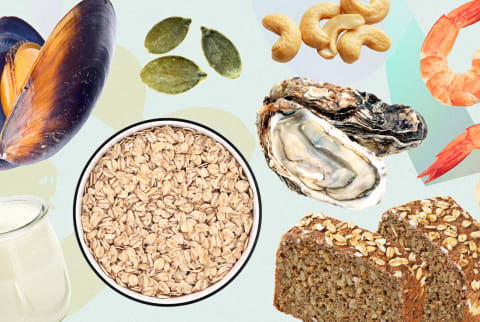The Top 4 Zinc-Rich Foods To Add To Your Diet, From An RD


Maintaining our health is top of mind right now. So along with keeping your medicine cabinet properly stocked, your kitchen should also be stocked with food to help support a healthy immune system. Studies have shown one of the main immune-strengthening nutrients is zinc1, and since our bodies don't produce it naturally, it's time to eat up.
Why zinc?
Zinc maintains proper functioning of the immune system by activating T-lymphocytes (aka T-cells)2, which help the body regulate its immune response by attacking infected cells. The nutrient is also a great source of antioxidants1, which help stabilize free radicals, thus protecting the cells from weakening and becoming vulnerable to pathogens3.
While zinc won't treat COVID-19, proactively feeding your body these nutrients—along with these other tips to help strengthen your immune system—will help ensure you stay healthy. To that end, we asked registered dietitian Jessica Cording, M.S., R.D., CDN, to share her favorite zinc-rich foods, and lucky for us, they don't seem too hard to find.
Oysters
Just 3 ounces of these shellfish provide 673% of your daily value, according to the National Institutes of Health (NIH). Since dining out isn't an option these days and fresh oysters may be hard to come by, Cording said the canned varieties—which often come unshelled and smoked—are just as great. "They're delicious on a salad, tossed in pasta, or as a garnish for soup," she told us.
Red meat, specifically beef
Great news for you meat eaters: Beef comes right behind oysters with the second highest source of zinc. Cording said other red meats, like lamb and pork also provide some of those nutrients, just not as much. In fact, a broiled beef patty contains 48% of your daily value, while a pork chop contains only 26%, according to NIH.
Beans
Beans, beans, the magical food. Whether it's chickpeas, cannellini, or black beans, we're all about the health benefits of legumes. For those following a plant-based diet—or others who don't eat meat or shellfish—eating only half a cup of baked beans can provide up to 26% of your daily value, the same amount as pork.
Pumpkin seeds
While lots of seeds are high in zinc (hemp, chia, flax, sunflower), Cording primarily recommended pumpkin seeds. One ounce of pumpkin seeds (or 85 seeds) provides 19% of the daily recommended dose of zinc. Bonus: It also provides 18% of your daily dose of magnesium, which helps support sleep and, subsequently, the immune system.
What's the bottom line?
"If you're willing to put some thought into it, you can meet your basic needs through food," Cording said. "However, if you have limited grocery options available or your needs are increased due to illness," Cording said, "having a supplement as a backup can also be helpful."

Abby Moore is an editorial operations manager at mindbodygreen. She earned a B.A. in Journalism from The University of Texas at Austin and has previously written for Tribeza magazine. She has covered topics ranging from regenerative agriculture to celebrity entrepreneurship. Moore worked on the copywriting and marketing team at Siete Family Foods before moving to New York.